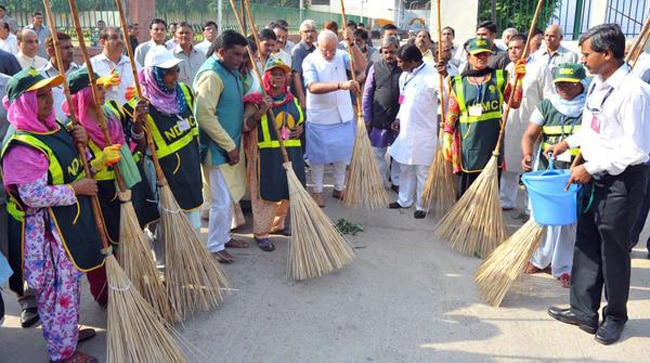The Indian PM reportedly chose the 145th anniversary of the birth of India’s founding father, Mahatma Gandhi, to launch the Swachh Bharat Abhiyan for a clean India.
It is pertinent to highlight that Gandhi himself was an enthusiastic proponent of personal and public hygiene.
Modi marked Gandhi’s birth anniversary by taking up the broom and asking public servants to sacrifice the public holiday and report to work.
Indians welcomed the event with enthusiasm—social media including Twitter and Facebook was awash with praises for the new PM and his grand vision of ensuring a “clean” India.
Making the Delhi public servants clean their own toilets was undoubtedly a good media-grabbing exercise.
However, India’s sanitation woes arise from a different set of problems and need a relentless, sustained partnership between government agencies, NGOs, local bodies and the public.
Swachh Bharat is a laudable goal but the key denominator to reach the goal is the attitudinal shift on cleanliness practices among Indians, especially the habit of considering all the available spaces out their homes as dustbins.
Indians just need to find an empty space. Within days, the space gets filled with garbage. People urinate and defecate almost anywhere and the concept of common, clean space is almost missing in the consciousness of Indians.
Thanks to the official neglect and callousness, millions of Indians still live in slum-like conditions without proper access to water and sanitation.
Further, litter and garbage could be cleaned up for a few days, but what about the possibility of a viable garbage collection and disposal system?
Ground realities aside, some of the media outlets reported of a significant rise in economic growth should Modi achieve his sanitation targets.
“Some 200,000 Indian children under the age of 5 die every year from diarrhea. There is a cost to gross domestic product (GDP) as well, caused by malnutrition and other health problems which significantly reduce the productivity of the workforce,” Livemint reported.
According to Livemint, “If Modi meets his goal of achieving certain key sanitation targets in five years, the campaign could add at least 1 percentage point to India’s GDP growth every year, roughly the same quantum as a unified goods and services tax (GST) would yield. Clearly, it’s a worthy effort.”
It remains to be seen whether Modi’s initiative would transcend from being just another chimerical media campaign to actually solving India’s immense sanitation problems.
Abdul Kuddus is a Delhi based passionate blogger and works at Tata Consultancy Services. He is a learning solutions consultant by profession and has been writing for different websites.

